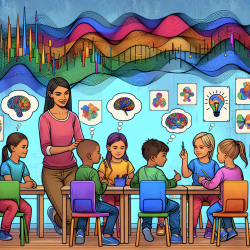Introduction
The COVID-19 pandemic has been a global disruptor, affecting various aspects of life, especially mental health. Recent research titled "Parental loneliness, parental stress and child mental health during the COVID-19 pandemic: Variations by cumulative socioeconomic risk" highlights how parental stress and loneliness during the pandemic have influenced child mental health, particularly in socioeconomically disadvantaged families. This blog aims to translate these findings into actionable insights for practitioners working with children and families.
Understanding the Research Findings
The study involved a large sample of parents in Québec, Canada, and investigated the relationship between parental stress, loneliness, and child mental health. The key findings were:
- Child internalizing symptoms (like anxiety and depression) were associated with higher levels of parental stress (β = 0.14) and loneliness (β = 0.23).
- Child externalizing symptoms (such as hyperactivity and aggression) were also linked to parental stress (β = 0.13) and loneliness (β = 0.18).
- These associations were more pronounced in families with higher cumulative socioeconomic risks.
These results suggest that the mental health of children is closely tied to their parents' mental health, especially in households facing socioeconomic challenges.
Implications for Practitioners
For practitioners, understanding the link between parental mental health and child outcomes is crucial. Here are some ways to implement these findings in practice:
- Screen for Parental Stress and Loneliness: Incorporate assessments of parental mental health into routine evaluations. This can help identify families at risk and tailor interventions accordingly.
- Provide Support for Parents: Develop programs that address parental stress and loneliness. Group-based interventions, such as mindfulness or stress management workshops, can be beneficial.
- Focus on Socioeconomic Factors: Recognize the role of socioeconomic risk in exacerbating mental health issues. Collaborate with community resources to provide comprehensive support to families.
Encouraging Further Research
While this study provides valuable insights, it also highlights areas for further research:
- Longitudinal Studies: Future research should explore the long-term effects of parental stress and loneliness on child mental health.
- Intervention Efficacy: Investigate the effectiveness of different interventions in reducing parental stress and improving child outcomes.
- Diverse Populations: Conduct studies in diverse populations to understand how cultural and contextual factors influence these dynamics.
Conclusion
Addressing parental stress and loneliness is not only crucial for the well-being of parents but also for the mental health of their children. Practitioners can play a pivotal role by implementing data-driven interventions and advocating for policies that support families, especially those facing socioeconomic challenges.
To read the original research paper, please follow this link: Parental loneliness, parental stress and child mental health during the COVID-19 pandemic: Variations by cumulative socioeconomic risk.










